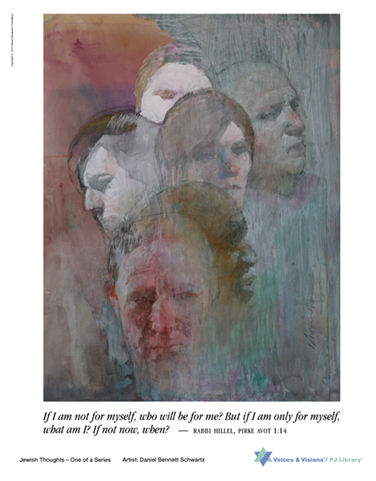
"If I am not for myself, who will be for me? But if I am only for myself, what am I? If not now, when?"
-Rabbi Hillel, Pirke Avot 1:14
Voices & Visions Dvar Torah
Congregation B'nai Torah - Forest Park Minyan (Springfield MA)
Shabbat Vayeitzei, November 9, 2013
By Bob Dashevsky
There are no chronological assumptions in the order of the 18 Voices & Visions posters we've been presenting since late June. Trying to emulate the sages of old (who matched readings from the Prophets -- the Haftorahs -- with the weekly Torah portion), I had the enjoyable task of matching each of the posters with a weekly Parsha.
This week's poster, the final in the series, was simply the last one left. Initially, the artwork by Daniel Bennett Schwartz, left me, again, scratching my head. The quote from Rabbi Hillel (Pirke Avot, 1:14) is, arguably, Judaism's most famous aphorism: If I am not for myself, who will be for me? But if I am only for myself, what am I? If not now, when?
Hillel's three-part question long has been venerated by the Jews and many others outside the Jewish community. The first part validates the importance of taking care of ourselves -- a healthy regard for our physical, mental and spiritual well-being. This necessarily goes beyond the self-centeredness of the "Me Generation". Without a fundamental concern for ourselves, we are diminished in our ability to be a positive force for anyone or anything beyond ourselves.
The second part of Hillel's question resonates with universality. It is a call to altruism. I hear echoes of it in the most famous line of JFK's inauguration speech -- Ask not what your country can do for you; ask what you can do for your country. The phrase finds a natural audience in an age when Tikkun Olam, for better or worse, has become synonymous with Judaism itself.
The third part also resonates. Carpe Diem! Seize the Day! Just Do It! It's no wonder that everyone loves this maxim. Its three queries balance and complement one another. These brief words from Rabbi Hillel, quite simply, are a prescription for living a good and purposeful life.
So on to Schwartz's illustration, which shows a grouping of six faces -- middle-aged to older adults, maybe representative of the gathering in this room. The faces partially hide one another. They gaze in different directions. The faces are expressionless, or perhaps contemplative, or perhaps worried or time-worn. They are obscured from a clear view as if by a mist or a gauzy curtain. This diffuse group portrait hardly seems to be a beacon for Hillel's words. What are these people thinking? What are they feeling? What are they going to do? We can't be sure.
In the same way, we cannot be sure about Yaakov (Jacob) in this week's parsha and in other parshas. Is he a good guy or is he, at heart, a deceiver? Is he a loving, responsible husband and father, or not? Yaakov's grandfather Avraham encountered God directly, doing His bidding, even arguing with the Almighty. Yaakov's father Yitzchak was rescued by an angel of God at the Akeidah. And Yaakov himself? He has a fuzzier experience of God -- a dream! How real was this dream?
Yaakov travels to Haran by himself, a pauper, living by his wits, seeking refuge, seeking a wife. So different from his father Yitzchak, who didn't have to lift a finger to find a bride. The servant Eliezer, with a gift-laden caravan, made it easy for Yitzchak, who remained at home. And Avraham -- he was clear-eyed about what was right and what was wrong; he had spiritual followers; he led armies in battle; and he lived to serve others. Yaakov, in contrast, had to make his own way. He was alone. He struggled to survive.
Perhaps like the people in the poster, Yaakov experienced uncertainty, indecision, conflict, puzzlement. He was a person of this world, battered and bruised by life's vicissitudes, acquiring wisdom the hard way -- perhaps also like these six faces, like all of us who struggle to find our way, to do the right thing ... and not always succeeding.
The saving grace for Yaakov, and for all of us, as we stumble through the world, getting up each morning, trying to muster renewed hope and determination, is that, like Yaakov, we are heirs to a deep and everlasting tradition forged to elevate the individual soul; and a tradition that also empowers each of us to, in some way, change the world. We know what our mission is, and the roadmap for fulfilling that mission, as Jews, is God's holy Torah.
To paraphrase the ending of another well-known Hillel aphorism that also balances consideration of self with consideration of others (Tractate Shabbat, 31A): "...That is the whole Torah; the rest is commentary. Now, go learn!"
If not now, when?
